Unit 1 lesson 1 At theAirport 课件(34张ppt)
文档属性
| 名称 | Unit 1 lesson 1 At theAirport 课件(34张ppt) |
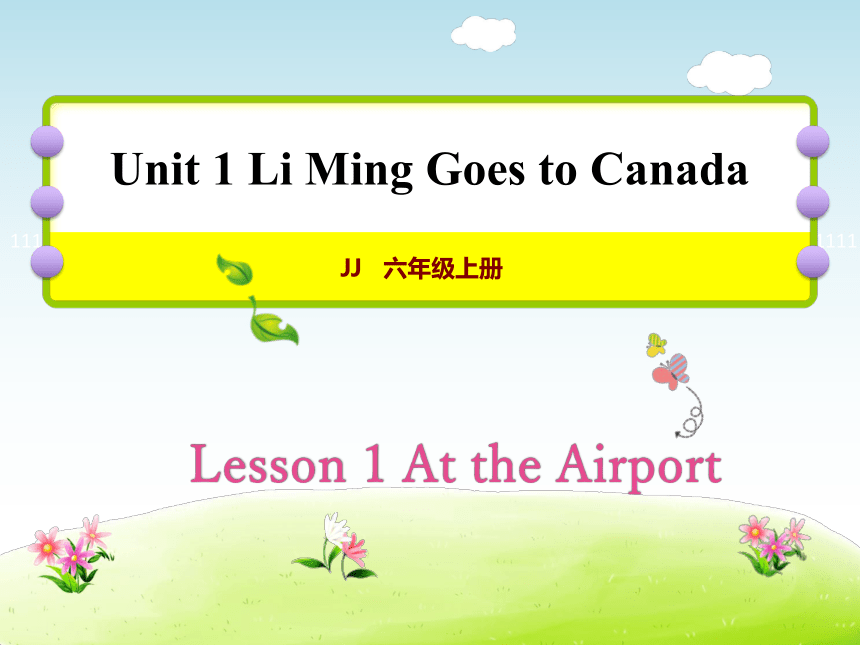
|
|
| 格式 | zip | ||
| 文件大小 | 2.4MB | ||
| 资源类型 | 教案 | ||
| 版本资源 | 冀教版(三年级起点) | ||
| 科目 | 英语 | ||
| 更新时间 | 2020-05-23 08:17:27 | ||
图片预览


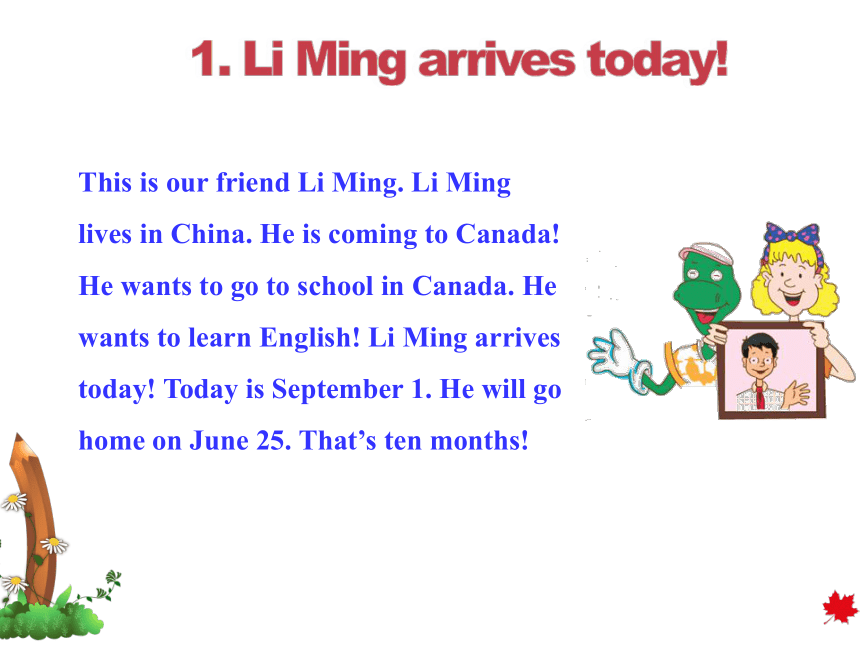
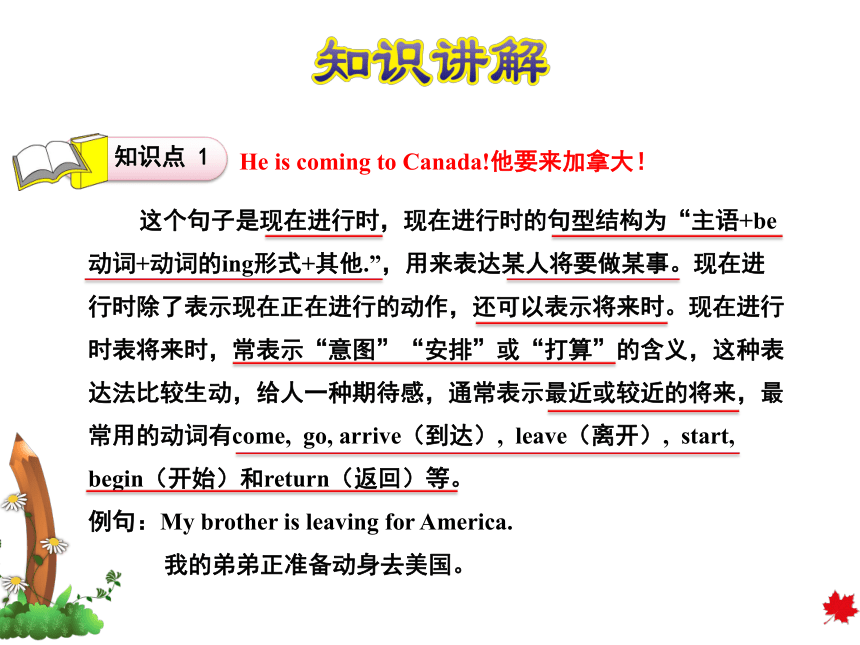
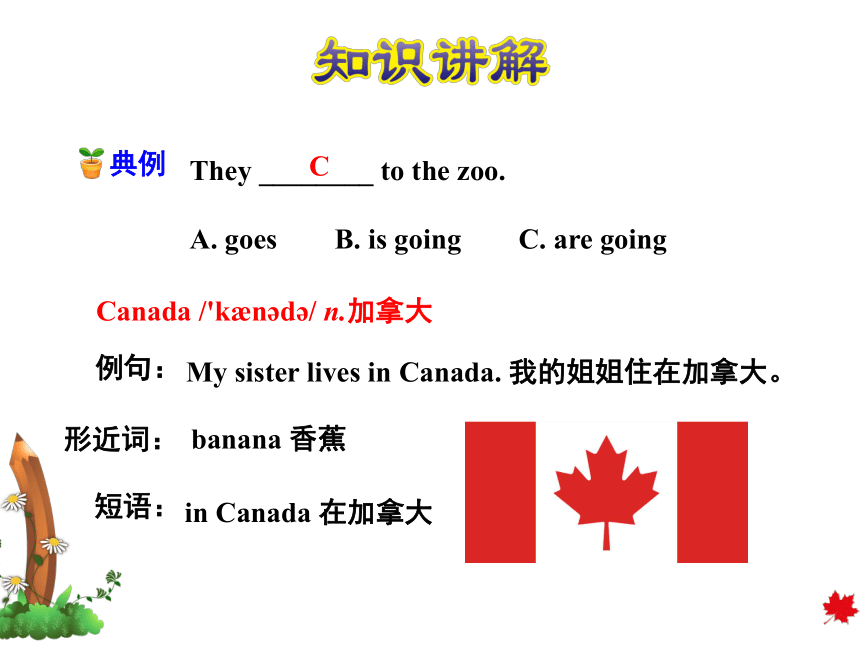
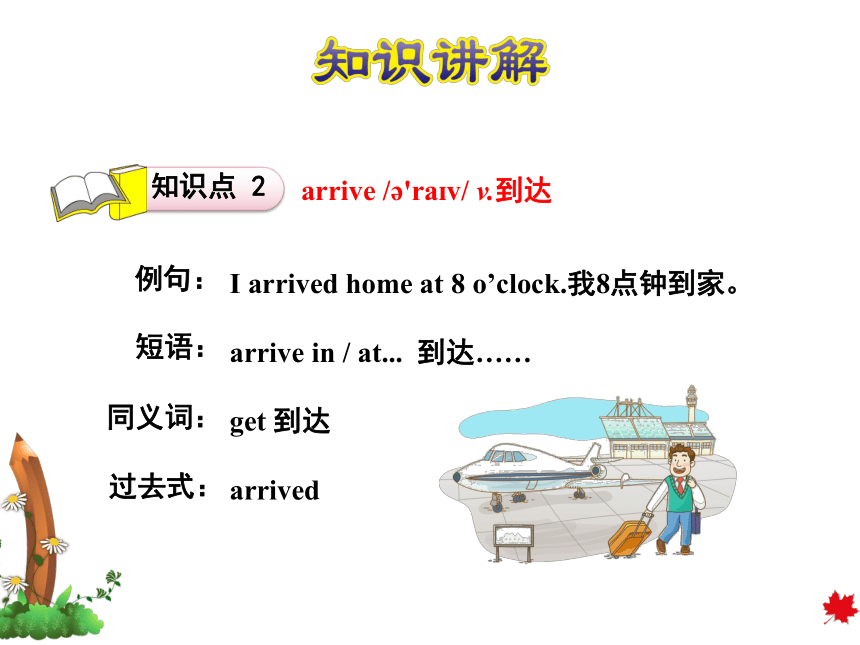
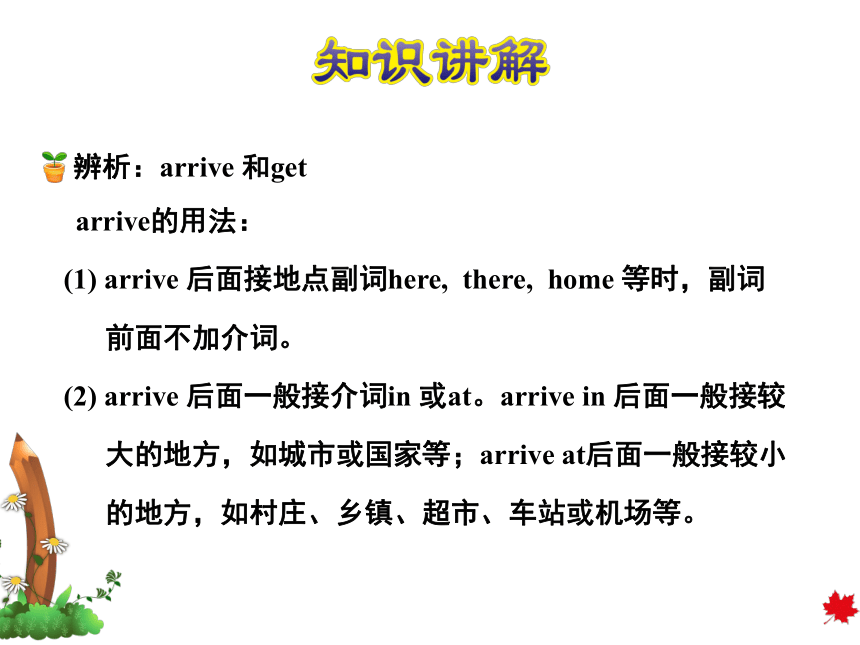
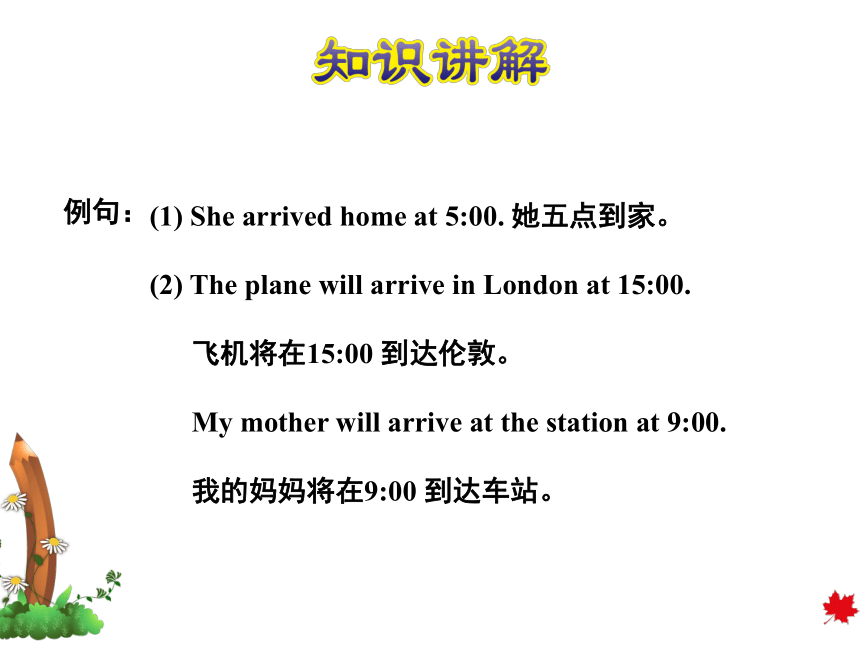
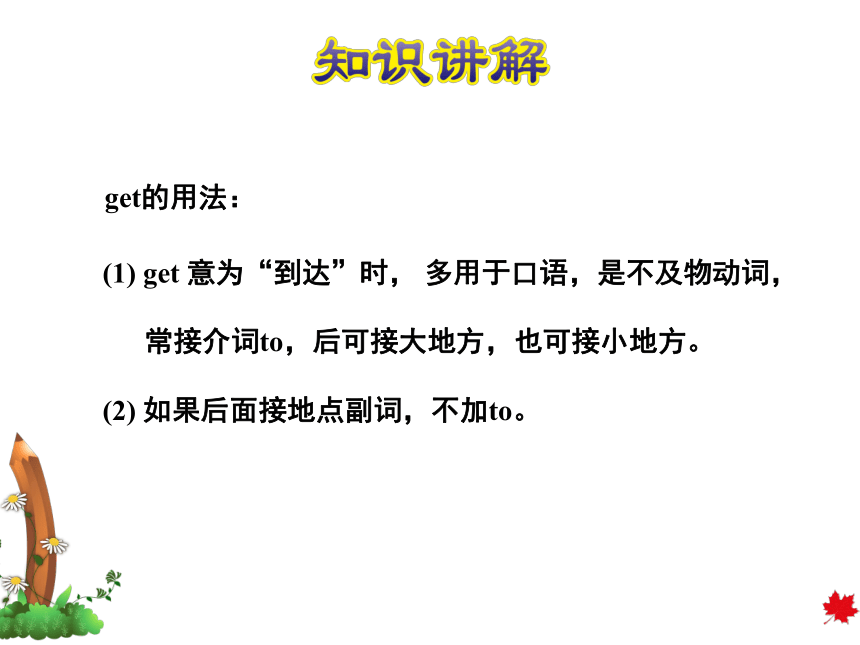
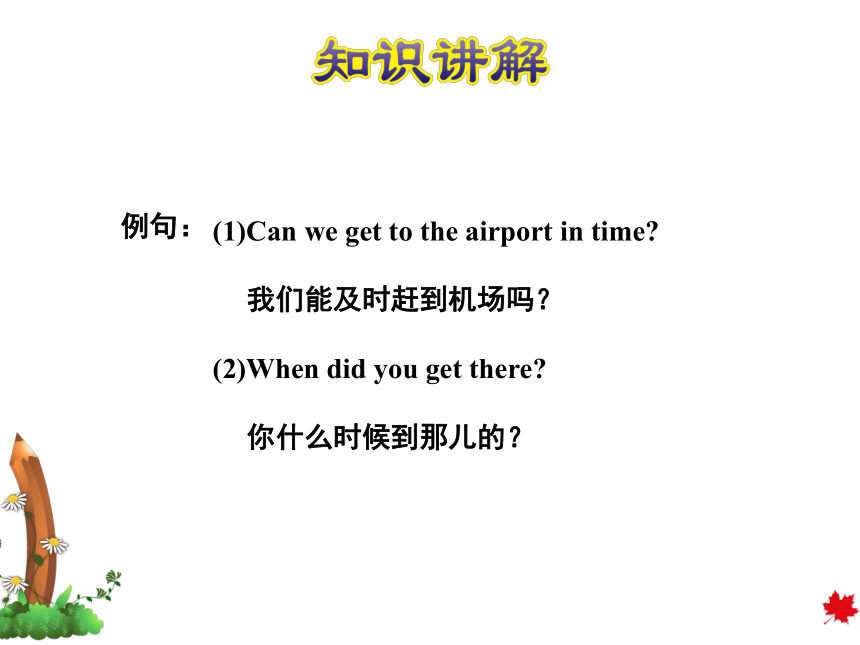
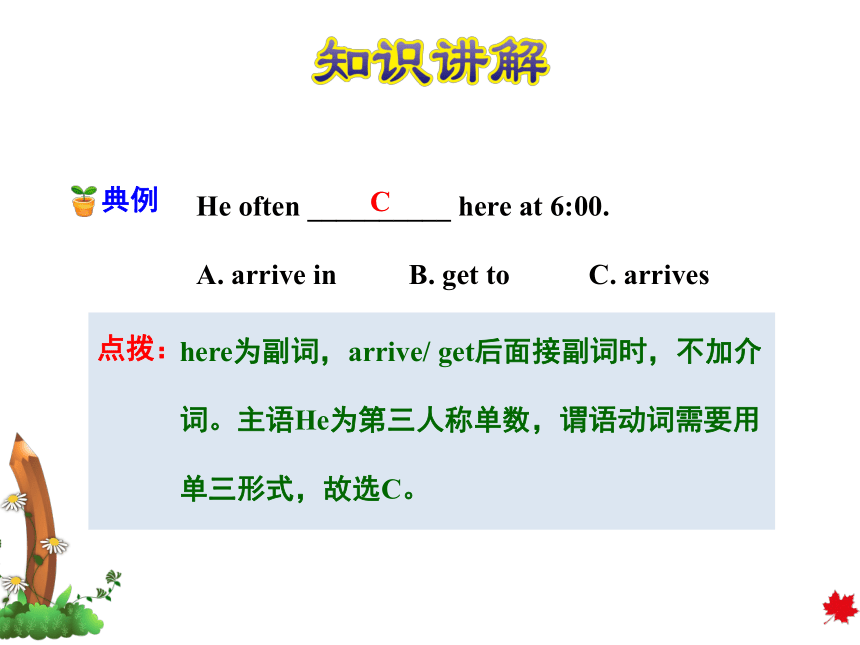
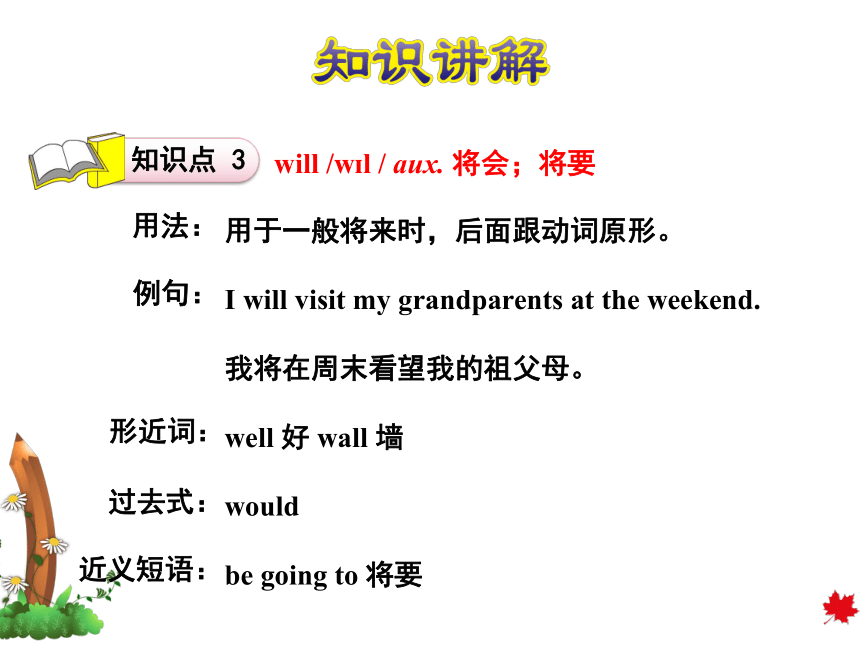
文档简介
(共34张PPT)
111111111111111111111111111111111111111111111111111111111111111111111111111111111111111111111111111111111111111111111111111111111111111111111
Unit 1 Li Ming Goes to Canada
JJ 六年级上册
This is our friend Li Ming. Li Ming lives in China. He is coming to Canada! He wants to go to school in Canada. He wants to learn English! Li Ming arrives today! Today is September 1. He will go home on June 25. That’s ten months!
He is coming to Canada!他要来加拿大!
知识点 1
这个句子是现在进行时,现在进行时的句型结构为“主语+be动词+动词的ing形式+其他.”,用来表达某人将要做某事。现在进行时除了表示现在正在进行的动作,还可以表示将来时。现在进行时表将来时,常表示“意图”“安排”或“打算”的含义,这种表达法比较生动,给人一种期待感,通常表示最近或较近的将来,最常用的动词有come, go, arrive(到达), leave(离开), start, begin(开始)和return(返回)等。
例句:My brother is leaving for America. 我的弟弟正准备动身去美国。
They ________ to the zoo.
A. goes??B. is going? C. are going
C
Canada /'k?n?d?/ n.加拿大
arrive /?'ra?v/ v.到达
知识点 2
I arrived home at 8 o’clock.我8点钟到家。
arrive in / at... 到达……
get 到达??
arrived
例句:
短语:
同义词:
过去式:
(1) arrive 后面接地点副词here, there, home 等时,副词前面不加介词。
(2) arrive 后面一般接介词in 或at。arrive in 后面一般接较大的地方,如城市或国家等;arrive at后面一般接较小的地方,如村庄、乡镇、超市、车站或机场等。
辨析:arrive 和get
arrive的用法:
(1) She arrived home at 5:00. 她五点到家。
(2) The plane will arrive in London at 15:00.
飞机将在15:00 到达伦敦。
My mother will arrive at the station at 9:00.
我的妈妈将在9:00 到达车站。
例句:
(1) get 意为“到达”时, 多用于口语,是不及物动词,常接介词to,后可接大地方,也可接小地方。
(2) 如果后面接地点副词,不加to。
get的用法:
(1)Can we get to the airport in time?
我们能及时赶到机场吗?
(2)When did you get there?
你什么时候到那儿的?
例句:
He often __________ here at 6:00.
A. arrive in B. get to C. arrives
C
点拨:
here为副词,arrive/ get后面接副词时,不加介词。主语He为第三人称单数,谓语动词需要用单三形式,故选C。
will /w?l / aux. 将会;将要
知识点 3
用于一般将来时,后面跟动词原形。
I will visit my grandparents at the weekend.
我将在周末看望我的祖父母。
well 好 wall 墙
would
be going to 将要
用法:
例句:
形近词:
过去式:
近义短语:
home /h??m/ n. 家【四会】
知识点 4
Welcome to my new home !欢迎来到我的新家!
my home 我的家
some 一些 come 来
例句:
形近词:
短语:
把几个字母看作一个整体来记忆单词的方法就是整体记忆法。如:把字母组合“ome”看作一个整体,在前面加上不同的字母,可以组成的单词有home, some, come 等。
整体记忆法:
Danny: Look at the clock. It’s half past four.
Jenny: Yes. Li Ming’s plane will arrive at five o’clock.
Danny: What time is it now?
Jenny: It’s 4:45. Please sit down.
Danny: What time is it now?
Jenny: It’s 5:15.
Danny: But I can’t see him.
Jenny: I see him!There he is!
Jenny: Hi, Li Ming!
Li Ming: Nice to see you!
Danny: Nice to meet you, too!Did you have a good trip?
Li Ming: Yes, thanks, but I’m tired.
Danny: Let’s go home!
clock /kl?k/ n. 钟表【四会】
知识点 4
My friend wants to have a clock.
我的朋友想有一只钟表。
字母o的发音是/?/。
把一个单词和另外一个或几个字母或单词合成一个新单词来记忆的方法。如:c + lock(锁)=clock。
整体记忆法:
公鸡(cock)打鸣赛钟表(clock)。
例句:
发音:
其他用法:表示整点钟时。要用“整点数+o’clock”。
如:It’s ten o’clock now. 现在十点钟了。
短语:an alarm clock 一个闹钟
half past four 四点半
知识点 5
现在,我们来学习一下时间的几种表达法吧!
顺读法 整点 钟点数(+o’clock)
six (o’clock)
非整点 钟点数+分钟数
six five
倒读法 分钟数在30以内 分钟数+past+钟点数
five past six
分钟数正好是30 half past+钟点数
half past six
分钟数在30以上时,(相差的)分钟数+to+钟点数加1,
例如:6点50 “ten to seven”。
past / pɑ?st/ prep. 晚于;在……之后
What about half past six? 六点半怎么样?
形近词:last 上一个的;最后的
pass 传递;通过
例句:
—What time is it now? 现在几点了?
—It’s 5:15. 五点十五分。
知识点 6
time /ta?m/ n. 时间【四会】
It is time to get up. 到起床的时间了。
字母i的发音是/a?/。
have a good time 玩得高兴
形近词:tie(n.)领带;(v.)系;绑
其他意义:time (n.)次,回
例句:
发音:
短语:
询问时间的句型
问句是一个由what引导的特殊疑问句,用来询问具体的时间。What time is it? 意为“几点了?”
肯定回答为:It’s+时间.
否定回答为:Sorry, I don’t know.对不起,我不知道。
当我们向陌生人询问时间时,应该先礼貌地说一声“Excuse me.”。
还能够用来询问时间的句子有:What’s the time?
例句:—What’s the time? 几点了?
???—It is 6 o’clock. 六点。
按要求完成句子。
It’s three fifteen.(就画线部分提问)
_______ ________ is it?
What time
There he is! 他在那儿!
知识点 7
“There he is!”意为“他在那里!”这是把there提到前面去了,正常语序为 “He is there!”把表示地点的there放在句首,起到强调作用。
(1)当句中的主语为代词时,以here/there开头的句型为:
Here / There +代词+动词(+其他).
例句:Here he comes. 他来了。
There she is. 她在那里。
(2)当句中的主语是名词时,以here/there开头的句型为:
Here / There +动词+名词(短语).
例句:Here is your coat.这是你的外套。
???There are our new books.那儿是我们的新书。
???There comes a bus.那边来了一辆公共汽车。
Did you have a good trip? 你旅途愉快吗?
知识点 8
have a good trip 旅途愉快
同义短语:have a good(nice) time
一般过去时的一般疑问句及回答
句型结构为“Did+主语+动词原形+其他?”,用来询问某人在过去的某个时间是否做了某事。问句由did开头,句中的谓语动词用原形。肯定回答为:Yes, 人称代词+ did.否定回答为:No, 人称代词+ didn’t.
例句:—Did you play football last Sunday?你上周日踢足球了吗?
???—No, I didn’t. 不, 我没有。
情景选择。
小明的妈妈想知道小明上周末是否读书了,他的妈妈应该怎么问? ( )
A. What did you do last weekend?
B. Did you read a book last weekend?
C. I’m going to read a book.
B
1. Read Part 1 and Part 2. Answer the questions.
a. How long will Li Ming be in Canada?
___________________________________________
b. When will Li Ming go home?
___________________________________________
c. How does Li Ming feel after the trip?
___________________________________________
Li Ming will be in Canada for 10 months.
Li Ming will go home on June 25.
He feels tired.
2. Ask and answer. Then write. What time is it?
a. b.
Beijing Ottawa Beijing London
It’s one o’clock in the
afternoon in Beijing. ___________________
___________________ ___________________
It’s 1:00 a.m. in Ottawa.
It’s 2:30 a.m. in Beijing.
It’s 7:30 p.m. in London.
一、单项选择。
1. —Jenny, please help me carry the books !
—I ________.
come B. is coming C. am coming
2. This is my friend. He ______ Chinese _______ my father.
A. learns; to B. learnt; in C. learned; from
C
C
点拨:
短语learn from...意为“向……学习”。
3. I will ______ you my new dress.
A. show B. shows C. showing
4. ______ you go to the park with me next weekend?
A. Will B. Would C. Is
A
A
点拨:
will后面接动词原形。
点拨:
由“next weekend(下周末)”可知,句子应该用将来时。故选A。
5. Look at the _____ on the wall. It’s eight ______.
A. clock; clock B. watch; clock C. clock; o’clock
6. Sorry, I have no ______ to go with you.
A. time B. a time C. times
C
点拨:
time 当“时间”讲时,是不可数名词,所以选A。句意是“对不起,我没有时间和你一起去。”
A
7. — _________is it now?
—It’s eight o’clock.
A. What B. How time C. What time
C
二、选择合适的选项填空。
A. in B. / C. at D. to
(1) How do you get _______ here ?
(2) Peter arrives _______ the station at 6:00.
(3) Dalong is coming ________ New York.
(4) My grandmother arrived _________England last week.
B
C
D
A
本节课我们学习了以下知识,请同学们一定加强巩固,以便能和同学们进行灵活交流哦!
重点词汇:Canada, arrive, time, clock, half
重点短语:arrive in/at…, have a good trip
重点句式:He is coming to Canada.
—What time is it now?
—It’s 4:45.
Did you have a good trip?
1 熟记本节课所学的句型、短语和单词,必须会听、说、读、写。
2 将There’s Li Ming!的对话朗读流利。
111111111111111111111111111111111111111111111111111111111111111111111111111111111111111111111111111111111111111111111111111111111111111111111
Unit 1 Li Ming Goes to Canada
JJ 六年级上册
This is our friend Li Ming. Li Ming lives in China. He is coming to Canada! He wants to go to school in Canada. He wants to learn English! Li Ming arrives today! Today is September 1. He will go home on June 25. That’s ten months!
He is coming to Canada!他要来加拿大!
知识点 1
这个句子是现在进行时,现在进行时的句型结构为“主语+be动词+动词的ing形式+其他.”,用来表达某人将要做某事。现在进行时除了表示现在正在进行的动作,还可以表示将来时。现在进行时表将来时,常表示“意图”“安排”或“打算”的含义,这种表达法比较生动,给人一种期待感,通常表示最近或较近的将来,最常用的动词有come, go, arrive(到达), leave(离开), start, begin(开始)和return(返回)等。
例句:My brother is leaving for America. 我的弟弟正准备动身去美国。
They ________ to the zoo.
A. goes??B. is going? C. are going
C
Canada /'k?n?d?/ n.加拿大
arrive /?'ra?v/ v.到达
知识点 2
I arrived home at 8 o’clock.我8点钟到家。
arrive in / at... 到达……
get 到达??
arrived
例句:
短语:
同义词:
过去式:
(1) arrive 后面接地点副词here, there, home 等时,副词前面不加介词。
(2) arrive 后面一般接介词in 或at。arrive in 后面一般接较大的地方,如城市或国家等;arrive at后面一般接较小的地方,如村庄、乡镇、超市、车站或机场等。
辨析:arrive 和get
arrive的用法:
(1) She arrived home at 5:00. 她五点到家。
(2) The plane will arrive in London at 15:00.
飞机将在15:00 到达伦敦。
My mother will arrive at the station at 9:00.
我的妈妈将在9:00 到达车站。
例句:
(1) get 意为“到达”时, 多用于口语,是不及物动词,常接介词to,后可接大地方,也可接小地方。
(2) 如果后面接地点副词,不加to。
get的用法:
(1)Can we get to the airport in time?
我们能及时赶到机场吗?
(2)When did you get there?
你什么时候到那儿的?
例句:
He often __________ here at 6:00.
A. arrive in B. get to C. arrives
C
点拨:
here为副词,arrive/ get后面接副词时,不加介词。主语He为第三人称单数,谓语动词需要用单三形式,故选C。
will /w?l / aux. 将会;将要
知识点 3
用于一般将来时,后面跟动词原形。
I will visit my grandparents at the weekend.
我将在周末看望我的祖父母。
well 好 wall 墙
would
be going to 将要
用法:
例句:
形近词:
过去式:
近义短语:
home /h??m/ n. 家【四会】
知识点 4
Welcome to my new home !欢迎来到我的新家!
my home 我的家
some 一些 come 来
例句:
形近词:
短语:
把几个字母看作一个整体来记忆单词的方法就是整体记忆法。如:把字母组合“ome”看作一个整体,在前面加上不同的字母,可以组成的单词有home, some, come 等。
整体记忆法:
Danny: Look at the clock. It’s half past four.
Jenny: Yes. Li Ming’s plane will arrive at five o’clock.
Danny: What time is it now?
Jenny: It’s 4:45. Please sit down.
Danny: What time is it now?
Jenny: It’s 5:15.
Danny: But I can’t see him.
Jenny: I see him!There he is!
Jenny: Hi, Li Ming!
Li Ming: Nice to see you!
Danny: Nice to meet you, too!Did you have a good trip?
Li Ming: Yes, thanks, but I’m tired.
Danny: Let’s go home!
clock /kl?k/ n. 钟表【四会】
知识点 4
My friend wants to have a clock.
我的朋友想有一只钟表。
字母o的发音是/?/。
把一个单词和另外一个或几个字母或单词合成一个新单词来记忆的方法。如:c + lock(锁)=clock。
整体记忆法:
公鸡(cock)打鸣赛钟表(clock)。
例句:
发音:
其他用法:表示整点钟时。要用“整点数+o’clock”。
如:It’s ten o’clock now. 现在十点钟了。
短语:an alarm clock 一个闹钟
half past four 四点半
知识点 5
现在,我们来学习一下时间的几种表达法吧!
顺读法 整点 钟点数(+o’clock)
six (o’clock)
非整点 钟点数+分钟数
six five
倒读法 分钟数在30以内 分钟数+past+钟点数
five past six
分钟数正好是30 half past+钟点数
half past six
分钟数在30以上时,(相差的)分钟数+to+钟点数加1,
例如:6点50 “ten to seven”。
past / pɑ?st/ prep. 晚于;在……之后
What about half past six? 六点半怎么样?
形近词:last 上一个的;最后的
pass 传递;通过
例句:
—What time is it now? 现在几点了?
—It’s 5:15. 五点十五分。
知识点 6
time /ta?m/ n. 时间【四会】
It is time to get up. 到起床的时间了。
字母i的发音是/a?/。
have a good time 玩得高兴
形近词:tie(n.)领带;(v.)系;绑
其他意义:time (n.)次,回
例句:
发音:
短语:
询问时间的句型
问句是一个由what引导的特殊疑问句,用来询问具体的时间。What time is it? 意为“几点了?”
肯定回答为:It’s+时间.
否定回答为:Sorry, I don’t know.对不起,我不知道。
当我们向陌生人询问时间时,应该先礼貌地说一声“Excuse me.”。
还能够用来询问时间的句子有:What’s the time?
例句:—What’s the time? 几点了?
???—It is 6 o’clock. 六点。
按要求完成句子。
It’s three fifteen.(就画线部分提问)
_______ ________ is it?
What time
There he is! 他在那儿!
知识点 7
“There he is!”意为“他在那里!”这是把there提到前面去了,正常语序为 “He is there!”把表示地点的there放在句首,起到强调作用。
(1)当句中的主语为代词时,以here/there开头的句型为:
Here / There +代词+动词(+其他).
例句:Here he comes. 他来了。
There she is. 她在那里。
(2)当句中的主语是名词时,以here/there开头的句型为:
Here / There +动词+名词(短语).
例句:Here is your coat.这是你的外套。
???There are our new books.那儿是我们的新书。
???There comes a bus.那边来了一辆公共汽车。
Did you have a good trip? 你旅途愉快吗?
知识点 8
have a good trip 旅途愉快
同义短语:have a good(nice) time
一般过去时的一般疑问句及回答
句型结构为“Did+主语+动词原形+其他?”,用来询问某人在过去的某个时间是否做了某事。问句由did开头,句中的谓语动词用原形。肯定回答为:Yes, 人称代词+ did.否定回答为:No, 人称代词+ didn’t.
例句:—Did you play football last Sunday?你上周日踢足球了吗?
???—No, I didn’t. 不, 我没有。
情景选择。
小明的妈妈想知道小明上周末是否读书了,他的妈妈应该怎么问? ( )
A. What did you do last weekend?
B. Did you read a book last weekend?
C. I’m going to read a book.
B
1. Read Part 1 and Part 2. Answer the questions.
a. How long will Li Ming be in Canada?
___________________________________________
b. When will Li Ming go home?
___________________________________________
c. How does Li Ming feel after the trip?
___________________________________________
Li Ming will be in Canada for 10 months.
Li Ming will go home on June 25.
He feels tired.
2. Ask and answer. Then write. What time is it?
a. b.
Beijing Ottawa Beijing London
It’s one o’clock in the
afternoon in Beijing. ___________________
___________________ ___________________
It’s 1:00 a.m. in Ottawa.
It’s 2:30 a.m. in Beijing.
It’s 7:30 p.m. in London.
一、单项选择。
1. —Jenny, please help me carry the books !
—I ________.
come B. is coming C. am coming
2. This is my friend. He ______ Chinese _______ my father.
A. learns; to B. learnt; in C. learned; from
C
C
点拨:
短语learn from...意为“向……学习”。
3. I will ______ you my new dress.
A. show B. shows C. showing
4. ______ you go to the park with me next weekend?
A. Will B. Would C. Is
A
A
点拨:
will后面接动词原形。
点拨:
由“next weekend(下周末)”可知,句子应该用将来时。故选A。
5. Look at the _____ on the wall. It’s eight ______.
A. clock; clock B. watch; clock C. clock; o’clock
6. Sorry, I have no ______ to go with you.
A. time B. a time C. times
C
点拨:
time 当“时间”讲时,是不可数名词,所以选A。句意是“对不起,我没有时间和你一起去。”
A
7. — _________is it now?
—It’s eight o’clock.
A. What B. How time C. What time
C
二、选择合适的选项填空。
A. in B. / C. at D. to
(1) How do you get _______ here ?
(2) Peter arrives _______ the station at 6:00.
(3) Dalong is coming ________ New York.
(4) My grandmother arrived _________England last week.
B
C
D
A
本节课我们学习了以下知识,请同学们一定加强巩固,以便能和同学们进行灵活交流哦!
重点词汇:Canada, arrive, time, clock, half
重点短语:arrive in/at…, have a good trip
重点句式:He is coming to Canada.
—What time is it now?
—It’s 4:45.
Did you have a good trip?
1 熟记本节课所学的句型、短语和单词,必须会听、说、读、写。
2 将There’s Li Ming!的对话朗读流利。
同课章节目录
- Unit 1 Li Ming Goes to Canada
- Lesson 1 At the Airport
- Lesson 2 Jenny's House
- Lesson 3 Making Breakfast
- Lesson 4 Making Dinne
- Lesson 5 In the Living Room
- Lesson 6 Baby Becky at Home
- Unit 2 School in Canada
- Lesson 7 On the School Bus
- Lesson 8 Li Ming Meets Jenny's class
- Lesson 9 Mr. Wood Teaches a Lesson
- Lesson 10 How Many Are There ?
- Lesson 11 Always do your homework!
- Lesson 12 Be Safe on the Way
- Unit 3 Winter in canada
- Lesson 13 Seasons
- Lesson 14 Snow! It's Winter!
- Lesson 15 Winter Fun
- Lesson 16 A Skating Lesson
- Lesson 17 I Like All Seasons!
- Lesson 18 The Snowman
- Unit 4 Christmas
- Lesson 19 Christmas Is Coming!
- Lesson 20 Oh,Christmas Tree
- Lesson 21 Christmas Cards
- Lesson 22 Christmas Gifts
- Lesson 23 It's Christmas Morning!
- Lesson 24 Maddy's Christmas
